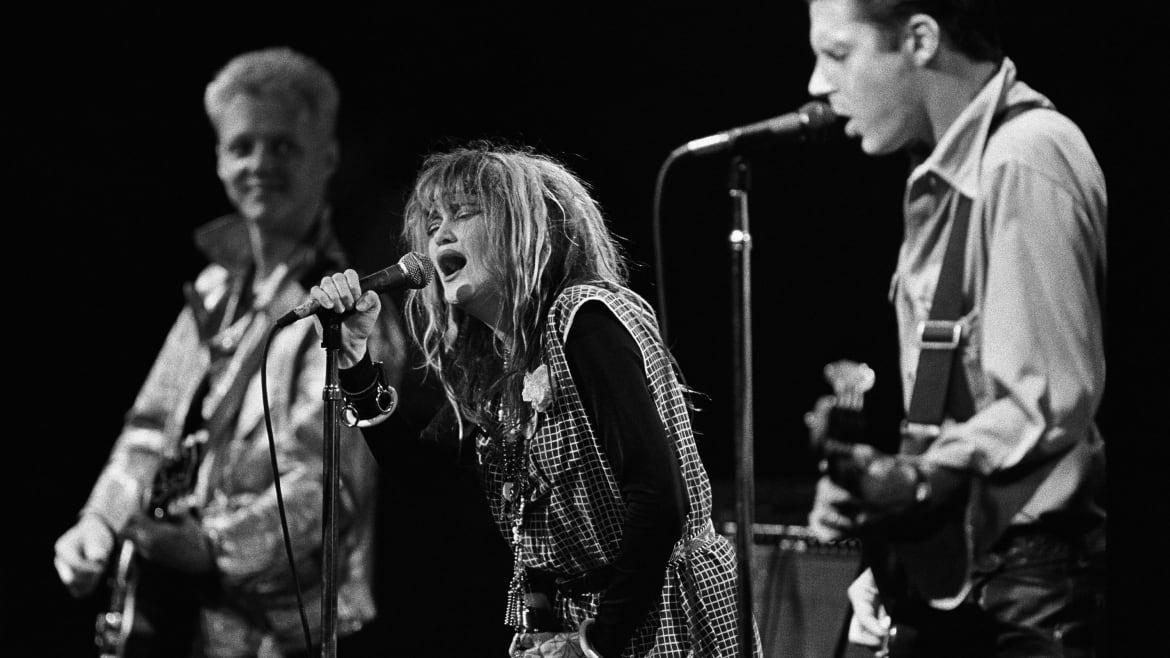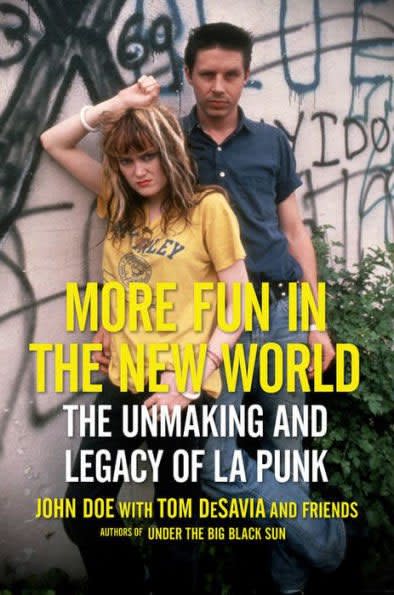When X Took Punk Into Reagan Country, the Ride Got Dark

To read an interview with John Doe and Tom DeSavia, co-editors of More Fun in the Real World: The Unmaking and Legacy of LA Punk, go here.
It was as if the blood of the Midwest was slowly leaking out.
All the people and buildings and rivers and corn fields remained, but all were slightly shrunken or withered. Even though we would see the Mighty Mississippi flood its banks a couple times and run its waters fifty feet over its banks, right up to the steps of the Mississippi Nights night club, this whole swath of land and its people were sad, sitting in a corner with their head drooping.
The “trickle down” economics were trickling somewhere else, if at all. Manufacturing plants closed or laid off most everyone. Steel mills had refused to modernize back in the mid-seventies. Some workers at the remaining auto plants and parts suppliers avoided losing their jobs when senior union workers took vacation leave or cut their hours so that junior members could keep working and keep the plant open. Yes, there were more and more people coming to clubs to see us, but they were sad and had lost their jobs, and so we tried to keep our ticket prices low and give them a night off when they didn’t think about their problems.
In a poem Exene used the phrase “smokestacks & steeples” to describe these cities. We tried to make it a song but never quite could.
She loved the working class. Her dad, Lou, worked as a carpenter most of his life and kept their family just on the lower edge of the middle class. He was a tough Chicago bohunk who gave her the work ethic all of us knew from the forties and fifties. Somehow we applied that “head down,” “nose to the grindstone” method to our band. We took the opportunities we were offered and toured and wrote songs as if our life depended on it—because it did.
At this point in time we saw those broad shoulders slumping and farmers were losing their homes like one of our heroes, Woody Guthrie, sang about. Now a major shift was happening right before our eyes, and since we crisscrossed the country several times in just a few years, it couldn’t be ignored.
Punk and All the Sex and Love and Gender-Bending We Forgot About
I didn’t much care for Ronald Reagan. He didn’t strike me as very smart or connected to people working for a living, even though they were the ones who elected him. Maybe for the first time we thought that someone else pulled the strings on the commander-in-chief. Maybe now you couldn’t figure out who or what was responsible for everything going to hell. Exene and I protested the 1980 presidential election by taking a train to Guadalajara, Mexico, because it seemed evident that this strait-laced, movie cowboy was changing the whole deal in Amerika.
By 1983 many of those changes had taken effect. He busted unions, and the middle class didn’t see much reason for celebration. Even now this economic debate continues, but the general morale in the country, especially the Midwest, seemed at an all-time low. We noticed that we didn’t know many people who belonged to unions like the ones our parents were a part of or had known.
After the release of our second record, Wild Gift, we toured at least four to six months a year. My International Travelall couldn’t stand all that mileage, so from 1980 through early ’84 we toured in a white, Chevy step-van. Back then people called them “bread trucks,” but nowadays a UPS truck would be the best description.

Billy Zoom had a vision of how to convert this white shell of a vehicle, and the final result was certainly that. He said country-western bands that couldn’t afford buses would convert a step van for their version of a tour van. We decided that being able to stand up as we rolled
down the road warranted having a truly original vehicle. Why should we settle for some old Ford or Dodge fifteen-passenger van? So, in the parking lot behind Billy’s second-floor apartment near Melrose and La Brea, we converted this 1979, sixteen-foot box delivery van into our tour dream on wheels. I believe we bought it for around seven grand, which was quite a bit then, but it was almost new with very low mileage. We changed the rear differential so it drove smoother & faster on the highway. These trucks were set up for city driving only.
I’m not certain why Billy was so motivated to tackle this grand project. This was not his general demeanor, but he/we attacked it with a kind of manic intensity & determination. Maybe small amounts of “medicinal” speed helped? I know that we were dedicated to making this band the most grand adventure, and we were going to do it in style. This whole conversion connected with our DIY spirit and we didn’t mind being shade-tree mechanics.
We rented a Milwaukee Sawsall to cut out hunks of the side panels & put in sliding bus windows. We built a couch out of two-by-fours, made foam seats, installed a passenger seat from the junk yard, screwed in sound insulation covered by plywood siding, which we Varathaned with a clear resin. Exene contributed by walking over to Pink’s for chili dogs before it was so popular that a gargantuan line of tourists prevented the local disciples from going there. Billy designed & built a back compartment for our gear that, on the inside of the van, made a platform for a queen-sized bed/loft just behind and above the couch. We also wired a couple of speakers above the front windshield with a lead to plug in a cassette player/boombox.
Even with the carpet, beanbag chair behind the driver’s seat, six to seven people, coats & assorted clothes, etc., it was still pretty damn loud rolling down the highway, practically too loud to hear the stereo we’d installed. So what we played was like natural selection—quiet country or blues didn’t stand a chance. We opted for the Sun Records mix tapes Phil or Dave Alvin made us, James Brown, Little Willie John, or other mix tapes of fifties, sixties & seventies rock 'n’ roll and garage bands.
We watched the state of things in the whole United States through these windows as the landscape rolled slowly past. We saw the flooded Mississippi when The Replacements opened for us. We ran off the road in Oregon, pitching Exene and me out of that loft bed—our biker roadie Kit Miara got an endless amount of shit for that one. We had to install a second gas tank because west Texas didn’t have twenty-four-hour gas stations close enough together for us to drive through the night. The night we learned that, we stayed in a fleabag motel in Balmorhea instead of running out of gas on the side of the road. When I asked the desk clerk with curlers in her hair for a wake-up call, she reached under the desk, plopped an alarm clock in front of me, and said, “Here’s yer wake call.”
We noticed the decline and decay of the U.S. and a general shift in the mood of its people. Exene connected so deeply with this situation, possibly because of her dad or because she saw the rural Midwest that she loved disappearing along with its working class, which was being ignored, soon to be forgotten. She and I identified with the sturdy, no-BS Midwest since we both knew that from when we were kids. She wrote all the words to the song “The New World” in one sitting on one page of her journal. As happened several other times, she wrote a piece that had its own rhythm, sometimes rhyming, sometimes not, but from top to bottom it was a complete song.
I had begun playing more acoustic guitar, using it as a writing tool, and learned the traditional rock ‘n’ roll “dun-da-dun-da-dun” like almost every early rock ‘n’ roll song. In the key of A all you have to move is one finger & you’re playing that signature Chuck Berry or blues lick. Since I always looked for a way to turn things upside down or at least sideways, I thought, “What if I started with the second note and then went down to the first note ‘da-dun-da-dun’?” This became the main musical figure for the verse of “The New World.”
There might’ve been some editing, but the song’s lyrics start with the story of a bum trying to get his first drink of the day. Years ago bars were closed on election day, and this old-timer couldn’t figure out what had happened to close his local bar. Recently Exene told me that this was the key to the whole song. The concept that “nobody knows what’s going on,” just like we had, this hobo had checked himself out of society and had no way of understanding what was going on. At this point we all had an intuitive feeling that there might not be any way of truly knowing who or what caused this change and decline.
The difference was that this time the whole country began to have the feeling that strings were being pulled, that manufacturing was going away/overseas & it probably wasn’t coming back. Little did we know that thirty-five years later, long after global corporations had decided this issue of manufacturing, this would be a campaign promise that would help elect the forty-fifth president of the United States.
Excerpted from MORE FUN IN THE NEW WORLD, Copyright 2019 John Doe and Tom DeSavia, courtesy of Hachette Books.
Get our top stories in your inbox every day. Sign up now!
Daily Beast Membership: Beast Inside goes deeper on the stories that matter to you. Learn more.

